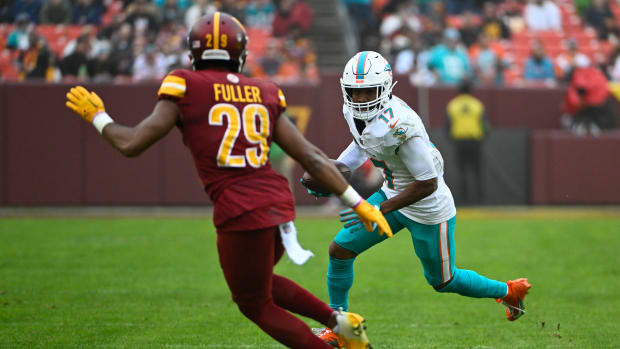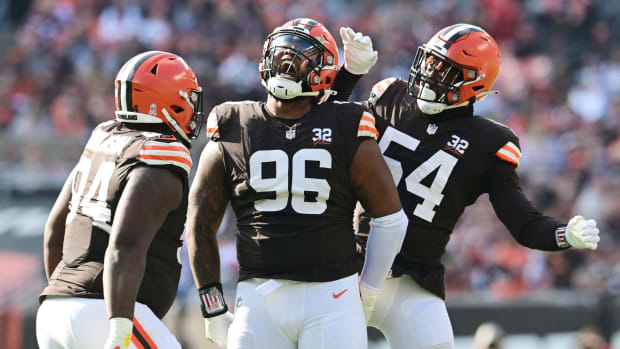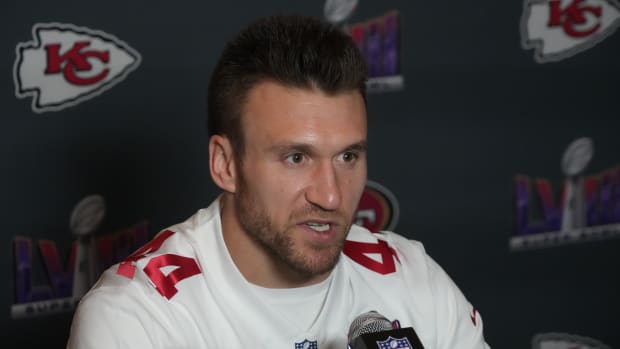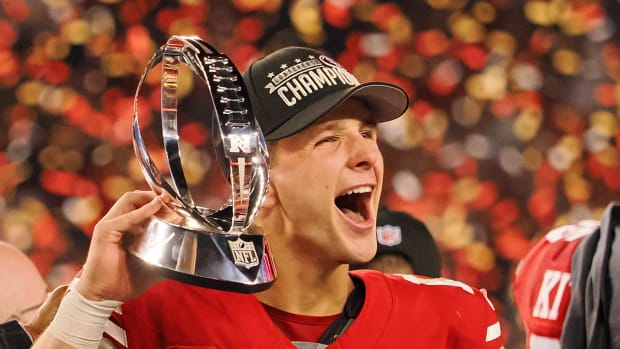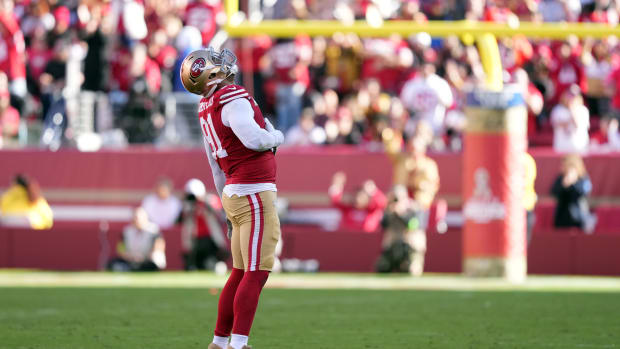49ers-Packers: Behind Enemy Lines, Part 4
This week, Bill Huber of Sports Illustrated's PackerCentral and I will do a six-part series breaking down the playoff matchup between the 49ers and the Packers.
Here's Part 4: The Packers rushing defense vs. the 49ers rushing offense.
THE PACKERS RUSHING DEFENSE
HUBER: Run defense has been a problem for the Packers for years and it’s a problem entering these playoffs.
While Green Bay finished 11th in run defense, it finished a woeful 30th with 4.70 yards allowed per carry. Some of that is fattened up by running quarterbacks. Washington ran for 195 yards with a 6.7-yard average at midseason. In Week 14, Chicago ran for 137 yards with a 6.0-yard average. In Week 15, Baltimore ran for 143 yards with a 5.3-yard average.
That leads us to Week 16, when Nick Chubb and the Browns demolished Green Bay to the tune of 219 rushing yards and 8.8 yards per carry. Chubb was unstoppable, gashing the defense again and again and again. A week later, though, the Packers gave up just 27 rushing yards against Dalvin Cook and the Vikings.
So, the Packers can play good run defense. Heck, they did in Week 3 at San Francisco, when they limited the Niners to 67 yards and a 3.2 average. The 49ers were without their top backs for that game but the edge-setting, discipline and eyes necessary to stop the run showed up that night.
It’s perhaps worth noting that Green Bay’s defense against running backs allowed 4.28 yards per carry.
It will face a familiar cast of character charged with winning this matchup on Saturday, with Dean Lowry and Tyler Lancaster joining Pro Bowler Kenny Clark on the defensive line. Clark is a terrific player who will command extra attention on practically every snap. This probably hasn’t been his best run-defending season, though, so the Packers will need him to deliver a monster game.
Where this defense is much, much different than years past is at linebacker with De’Vondre Campbell. Campbell is a remarkable story. A starter for all five NFL seasons (four in Atlanta, one in Arizona), he went unsigned through the first waves of free agency. The Packers signed him during their June minicamp to a one-year, $2 million contract. Campbell rewarded them with their first All-Pro season by an off-the-ball linebacker since the legendary Ray Nitschke in 1966. Campbell entered Week 18 leading the NFL in solo tackles. Of the top 32 players in total tackles, only Campbell and Washington’s Cole Holcomb recorded at least one sack, interception, forced fumble and fumble recovery. He’s a tremendous tackler with great instincts vs. the run and great length in the passing game.
Adrian Amos and Darnell Savage are the underrated tandem of safeties. Amos is so steady; Savage misses too many tackles. The health of cornerback Jaire Alexander’s shoulder – an injury that’s kept him out since Week 4 – will be important if he lines up in the slot.
THE 49ERS RUSHING OFFENSE
COHN: It's one of the most difficult rushing attacks in the NFL to stop even though everyone knows it's coming. And a big reason why it's so tough to defend is the scheme.
The 49ers don't focus on one blocking scheme -- they do everything. Zone blocking, man blocking. You name it. The 49ers have the most diverse and expansive run scheme in the league, which is why offensive coordinator Mike McDaniel is getting an interview to become the next head coach of the Miami Dolphins even though he doesn't even call the 49ers plays -- Kyle Shanahan does. McDaniel is the architect of the game, which is the most cutting-edge run scheme in football.
And the blocking is excellent, too. Left tackle Trent Williams, tight end George Kittle and fullback Kyle Juszczyk are the best run blockers in the NFL at their positions. The rest of the offensive line excels at run blocking, too. Even the wide receivers block well downfield, which is why the 49ers have so many long runs.
But the Packers have seen all this before from the 49ers, and still shut down their run game when they faced each other Week 3.
What the Packers haven't seen is Elijah Mitchell and Deebo Samuel the running back, or "wide back" as he refers to himself (half wide receiver, half running back).
Mitchell missed the Week 3 game with an injury. But he's healthy now, and has carried the ball 24.1 times per game in his past six starts. The 49ers lean on him so heavily because he's fast, tough and consistent, plus he has yet to fumble in his career. So the more he carries the ball, the fewer opportunities Jimmy Garoppolo has to throw interceptions (his career playoff interception percentage is 4.8).
But the key to the 49ers run game is Samuel, their All Pro wide receiver. Midway through the season, the 49ers realized he's their best running back, too. Since this dawned on them, they're 7-0 when they give him at least six carries, because he's averaging a rushing touchdown every 7.5 carries and generally scoring them from more than 16 yards out. He's almost impossible to stop.
The Packers have to find a way to shut down Samuel the running back.
So far, no one has.


